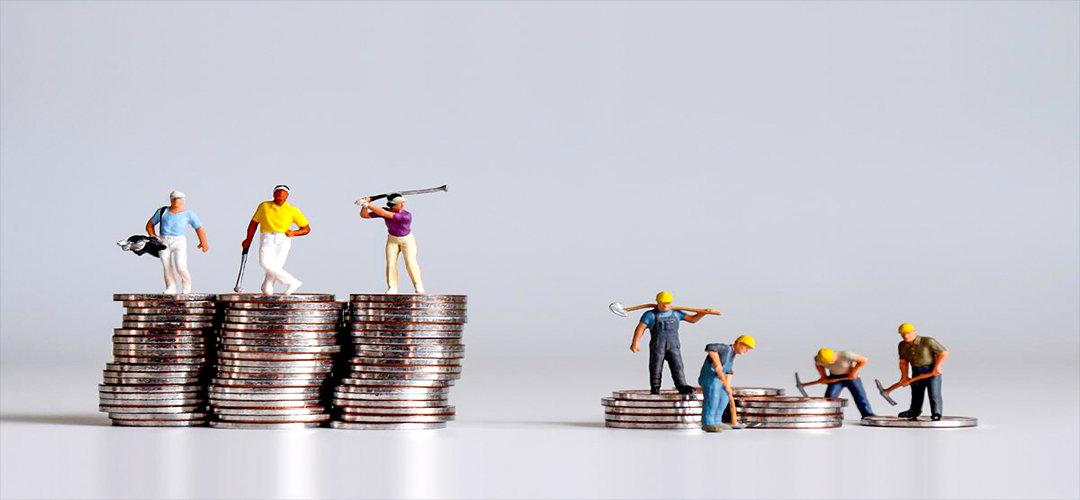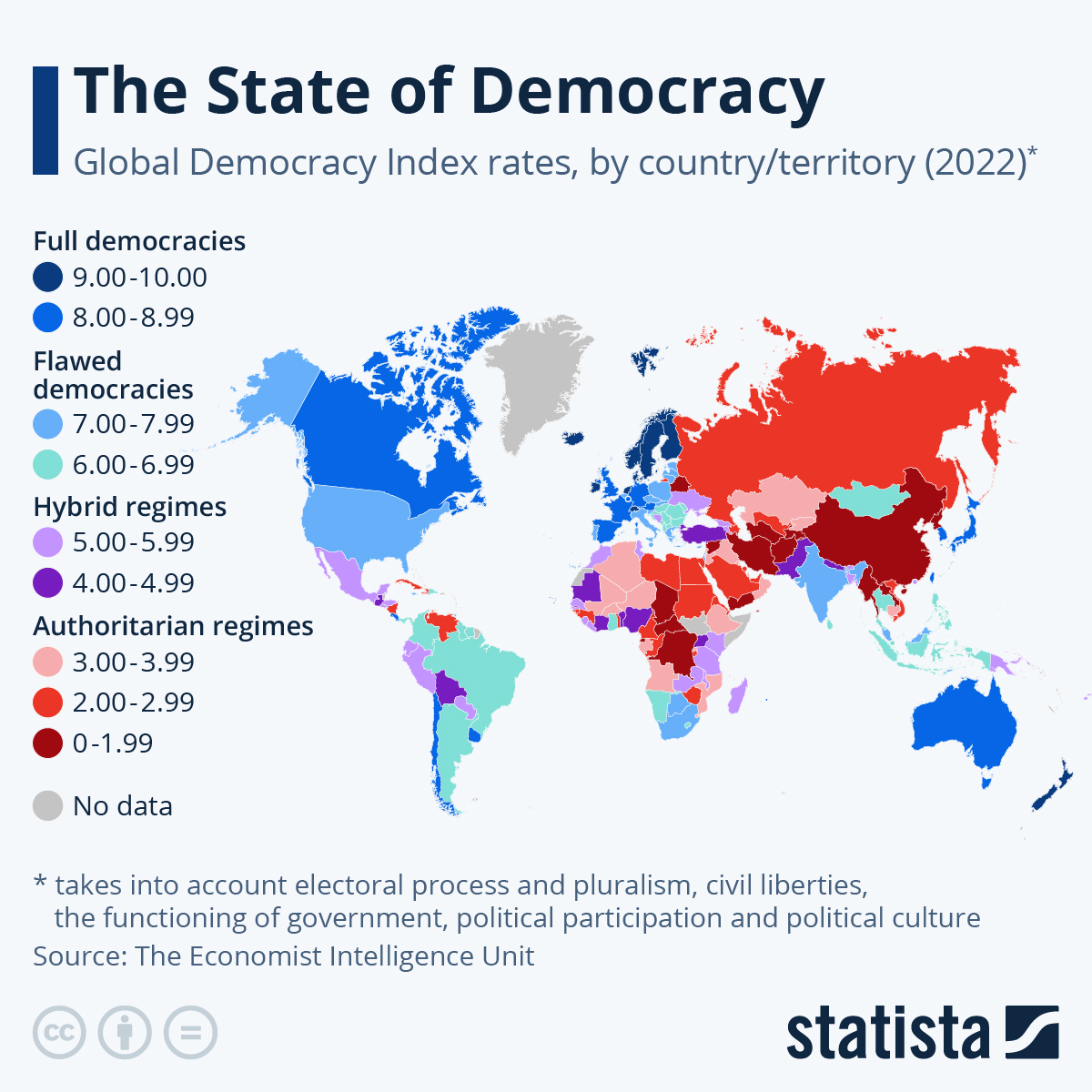Does Rising Inequality Threaten Democracy in the World?
March 4, 2023 | Expert Insights

Despite all the glib talks on globalisation, the brotherhood of mankind etc., one stark fact that emerged from the COVID-19 pandemic was the degree of inequality that exists today- not only within nations but also between nations. The vaccine nationalism proved beyond doubt that the Global North was callous to the lives of the lesser fortunate countries. Within nations, the poorest and the weakest suffered the most during the havoc wreaked by the following lockdowns.
As societies teetered on the edge of an economic precipice, democratic norms and institutions bore the brunt of peoples' anger, and authoritarian regimes tightened their grips to stay in power.
Therefore, as the world emerges from the ashes of the pandemic and struggles with the aftershock of a European conflict, it is time to re-assess the health of democracy worldwide.
Background
"Inequality" comes in many shades- economic disparities between members of various social classes regarding their income, wealth, power, and/or influence and the one between nation-states that define their geopolitical exchanges. The two key determinants in assessing inequality are the allocation of wealth and power and political instability, which frequently results in violence.
So, on the
one hand, we claim technological and economic progress, so how, on the other hand, can inequality increase?
Income disparities have worsened over time in different countries due to the vast difference in the growth of technology, globalisation, and other related phenomena. For example, during the twentieth century, there was huge relocation from underdeveloped to industrialised countries, which caused shifts in labour markets as well as social situations. Because the wealthy could better manage for themselves than the poor who relied on others, and for that matter, income was not dispersed equitably in industrialised countries.
Now if we talk about Political instability, which typically leads to competition, sometimes violent, for access to land and natural resources that are needed by persons living in these areas, this is another factor that may contribute to the increase of wealth disparity in a country. Conflicts, however minor their source, tend to spiral out of control, taking into their whole embrace societies including the governments, armed forces, and people. War is the ultimate scrouge of mankind and has remained so for centuries. The present-day Congo, Sudan, Yemen, Syria, Sub Sahara Africa etc., are perfect examples.
The human race has introduced yet another element-Climate disaster triggered by climate change. The same harsh weather conditions that cause cyclones and droughts have also contributed to poor incomes in the impacted countries.
Increasing inequality affects democracy in the same way it affects other systems. It leads to wider gaps in income levels, and bare existence becomes the sole objective of many, allowing the privileged classes to exploit them further. Democratic institutions like elections and parliaments mean little to Darfurians starving in the deserts of Western Sudan, raped and pillaged by horse-mounted Arab marauders. Even in nations which have a modicum of democratic systems existing, these are irreparably damaged, and tyranny and authoritarianism make a comeback- there are scores of such case studies existing in Africa.

Analysis
Even if the onslaughts on democracies are beaten back, they are left frail and incapable of deterring dictatorial tendencies amongst their ruling elites. Even worse, in their weakened state, such societies and nations are easy prey for stronger and more ruthless neighbours. When strong single-party nations like China invest billions of dollars into small struggling nations, there is an unexpressed dread amongst its intellectuals and educated class of being dominated politically and economically. Our neighbour Sri Lanka is a clear example where the huge national debts shattered the economy, bringing the people to the streets, forcing an elected president to flee his official residence, and handing over the control of prime national assets to a foreign power. Such situations cannot be called conducive to the growth of true democracy.
Of course, corruption lies at the heart of all economic inequality in most developed countries, even those that profess a socialist or communist system. Failed by their democratically elected elites, the people are tempted to take recourse to arms like the Naxalites of India’s tribal regions and the indigenous people of Peru and other Latin American countries. Kenya, one of the most promising democracies in Africa, supported a military coup against President Mwai Kibaki, whose corruption only led to poverty and unemployment for the common man.
Economic inequality stunts the democratic growth of a country trying to improve its economic condition. An excellent example is South Korea, where the government turned to harsh forms of governance to hold onto power after discovering that the economy was quickly contracting. Due to the country's tremendous economic expansion in the early 1960s, numerous industries were established, but they could not compete with American firms that produced high-tech electronics.
For a nation to become financially sound, it must have strong unions that defend its citizens' human rights. Rising inequality weakens such democratic organisations due to a lack of funds. Even campaigning during elections is an expensive proposition, and the weak and the marginalised cannot hope to defeat political candidates who are propped up by money and power. This phenomenon is on display worldwide whenever elections are being played out.
Assessment
- To sum up, rising inequality is neither desirable nor bad; it is simply a problem that must be dealt with by all world leaders. The people in charge of running the economy must make sure that the resources are distributed fairly.
- Even though democracy is not universal, it is present in every nation to some degree and is likely to continue with additional revolutions in those nations where it already exists. However, what is worrying is that instead of growing in strength, democracy is under attack due to rising inequality feeding discontent and uprisings. Anarchy is not a good breeding ground for democracy in any case.








Comments